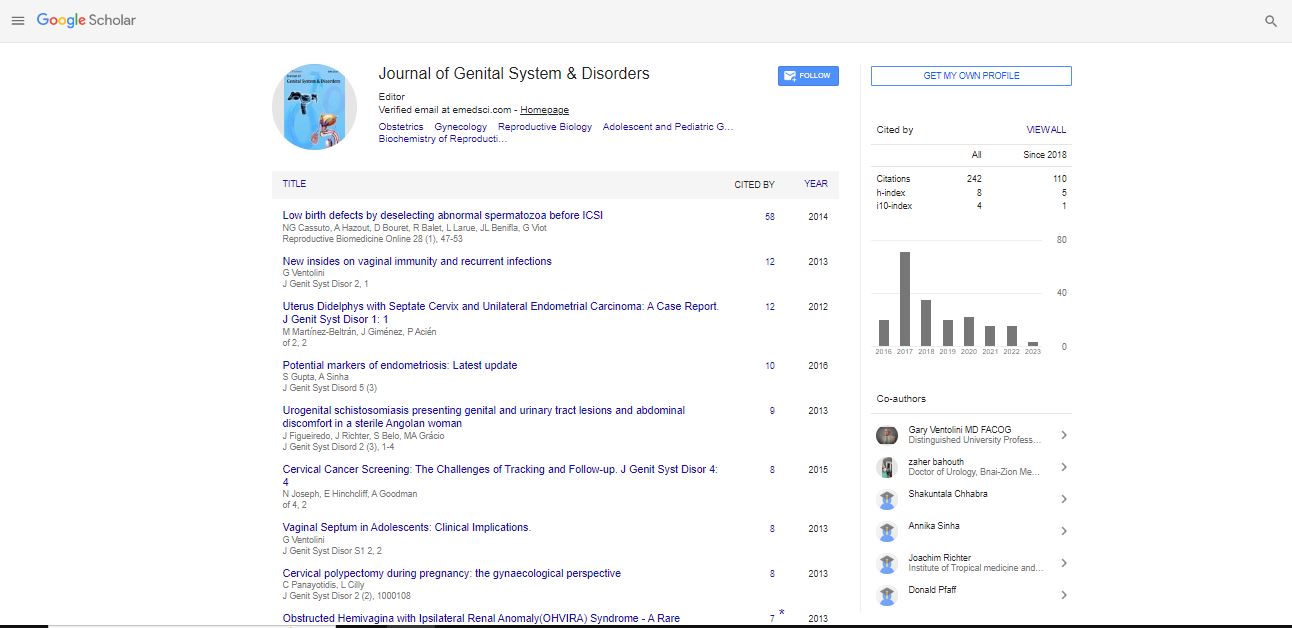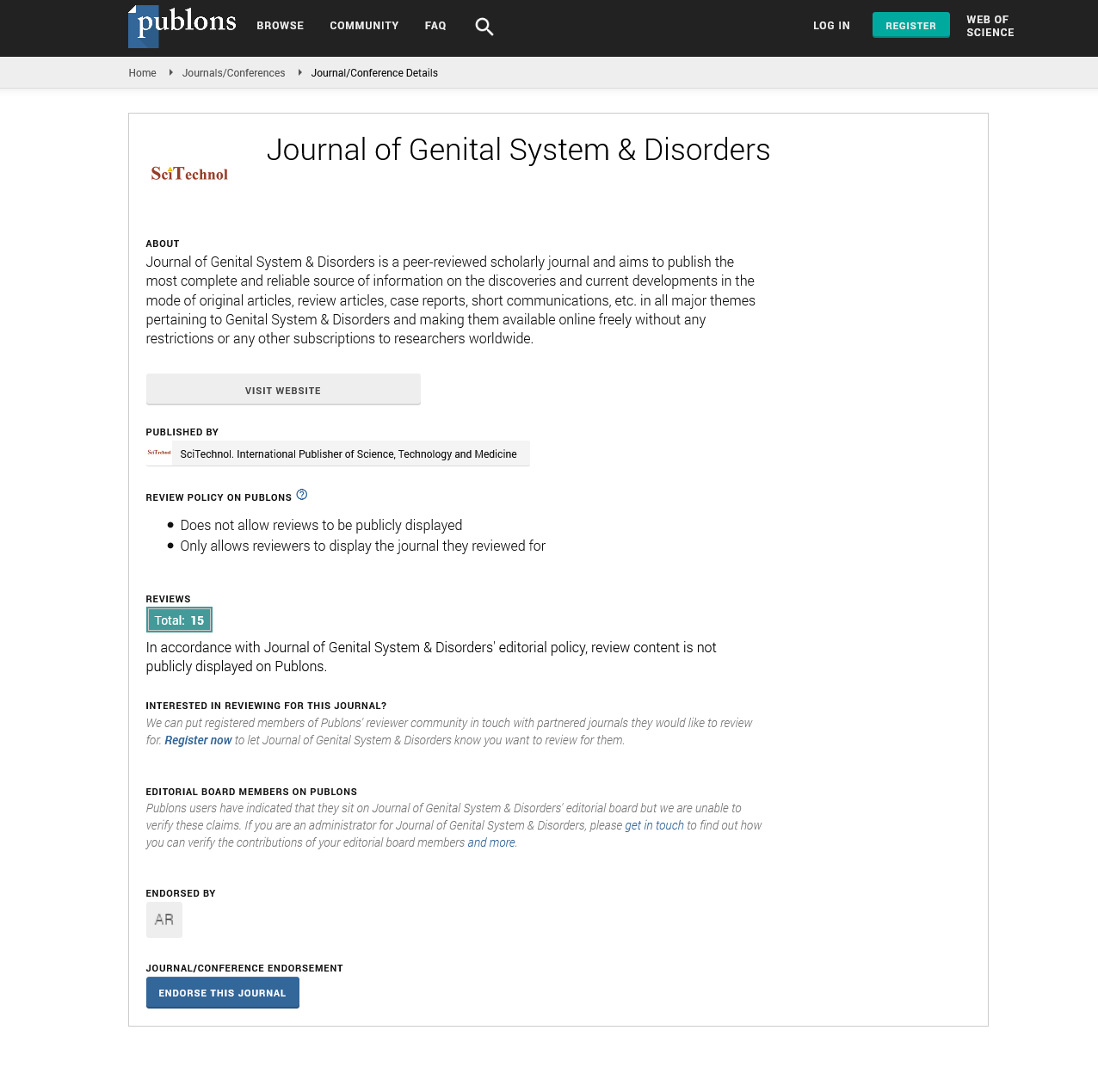Perspective, Vol: 14 Issue: 1
Complex Interplay of Genetics and Epigenetics in Reproductive Biology
Laura Wilson*
Department of Reproductive Biology, University of Cambridge, Cambridge, UK
*Corresponding Author: Laura Wilson
Department of Reproductive Biology, University of Cambridge, Cambridge, UK;
E-mail: wilsonlaura@upenn.edu
Received date: 02 March, 2024, Manuscript No. JGSD-24-128704;
Editor assigned date: 04 March, 2024, QC No. JGSD-24-128704 (PQ);
Reviewed date: 18 March, 2024, QC No. JGSD-24-128704;
Revised date: 03 March, 2025, Manuscript No. JGSD-24-128704 (R);
Published date: 10 March, 2025, DOI: 10.4172/2325-9728.1000287
Citation: Wilson L (2025) Complex Interplay of Genetics and Epigenetics in Reproductive Biology. J Genit Syst Disord 14:1
Description
The field of reproductive biology is a fascinating and complex area of study that encompasses a myriad of factors, including genetics and epigenetics. Understanding the interplay of genetic factors, environmental influences, and reproductive health outcomes is crucial for comprehending the intricacies of human reproduction and addressing issues related to fertility, pregnancy, and reproductive disorders.
Genetics, the study of genes and inheritance, plays a fundamental role in reproductive biology. Genetic factors can significantly influence an individual's reproductive health, fertility, and the occurrence of reproductive disorders. For example, genetic mutations or variations can lead to conditions such as Polycystic Ovary Syndrome (PCOS), endometriosis, and male factor infertility, impacting the ability to conceive and carry a pregnancy to term. Moreover, genetic disorders, such as chromosomal abnormalities and single gene mutations, can have profound implications for reproductive outcomes, including the risk of miscarriage, birth defects, and reproductive cancers.
In addition to genetics, epigenetics has emerged as a key player in shaping reproductive biology. Epigenetics explores the reversible modifications to DNA and histone proteins that can influence gene expression without altering the underlying genetic code. These modifications can be influenced by various environmental factors, including lifestyle, diet, chemical exposures, and stress. The interplay between genetics and epigenetics in reproductive biology is remarkable, as epigenetic changes can impact fertility, development, and the health of future generations.
One of the fascinating aspects of epigenetics is its ability to respond to environmental influences, resulting in alterations in gene expression patterns that can affect reproductive health outcomes. For instance, studies have shown that maternal diet and nutritional status can influence the epigenetic programming of the fetus, potentially affecting the risk of developing reproductive disorders later in life. Furthermore, environmental exposures to endocrine-disrupting chemicals have been linked to epigenetic changes that can impact fertility, pregnancy outcomes, and the reproductive health of offspring.
The intricate interplay of genetic and epigenetic factors in reproductive biology extends beyond individual health and fertility to encompass the broader concept of transgenerational epigenetic inheritance. This phenomenon suggests that epigenetic changes acquired during one's lifetime can be passed down to subsequent generations, potentially influencing the reproductive health and susceptibility to reproductive disorders in offspring. Understanding the mechanisms governing trans-generational epigenetic inheritance holds great significance for uncovering the long-term implications of environmental exposures and lifestyle factors on reproductive health across generations.
Advancements in genetic and epigenetic research have led to groundbreaking discoveries that have the potential to revolutionize reproductive medicine and fertility treatments. For instance, the study of epigenetic modifications in gametes and embryos has provided valuable insights into early embryonic development and implantation, paving the way for improved assisted reproductive technologies and embryo selection methods. Furthermore, unraveling the epigenetic basis of reproductive disorders may open new avenues for targeted therapeutic interventions aimed at modulating epigenetic marks to mitigate the impact of genetic and environmental factors on reproductive health.
In conclusion, the intricate interplay of genetics and epigenetics in reproductive biology is a captivating area of research with far-reaching implications for understanding the complexities of human reproduction and addressing reproductive health challenges. From unraveling the genetic basis of reproductive disorders to exploring the epigenetic influences of environmental factors on fertility and pregnancy outcomes, ongoing studies continue to shed light on the multifaceted nature of reproductive biology. As advancements in genetics and epigenetics continue to unfold, it is clear that a deeper comprehension of these interlocking mechanisms will not only enhance our understanding of reproductive biology but also pave the way for innovative strategies to optimize reproductive health and fertility.
 Spanish
Spanish  Chinese
Chinese  Russian
Russian  German
German  French
French  Japanese
Japanese  Portuguese
Portuguese  Hindi
Hindi 
